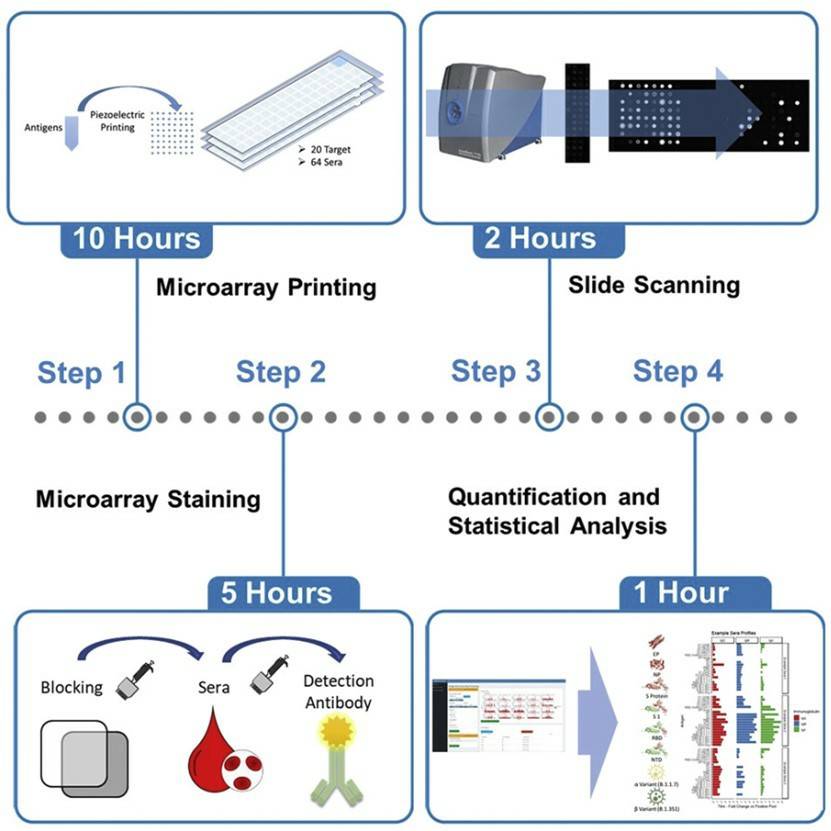Glycoprotein Microarray
With extensive expertise in glycoform and glycomics research, Creative Biolabs has established a glycoprotein analysis platform covering various services, which can provide our customers with personalized services, such as glycoprotein microarray.
Introduction of Glycoprotein Microarray
Glycosylation is the process of adding sugars to proteins or lipids under the control of enzymes. The glycosylated protein is called glycoprotein. Glycosylation is perhaps the most extensive and complex form of protein post-translational modification. Both N-linked and O-linked glycan variants, in the form of glycopeptides, glycolipids, glycosaminoglycans, or other glycoconjugates on the cell surface and in plasma, play important roles in various biological processes and disease progression.
Over the past decade, microarrays have emerged as an important tool for the characterization of glycoprotein and are generated by spotting the analytes on a chemically derivatized surface. The slides are usually probed with a detection reagent conjugated to a fluorescent tag, which are quantified by laser scanning. Microarrays enable simultaneous screening of multiple samples, to produce a probe-based profile of the sample.
At present, there are many microarray technologies for the glycosylation of proteins, such as lectin, antibody, and natural glycoprotein microarray. Lectin/antibody microarrays provide rapid glycosylation pattern analysis with moderate structural information but are limited by the number of lectins or antibodies available. As a discovery tool for biomarkers and a potential diagnostic tool, glycoprotein microarray provides the ability to screen a multitude of naturally occurring glycosylations in a single experiment. Furthermore, this method is not limited by the complexities of carbohydrate synthesis and the availability or high cost of antibodies.
Application of Glycoprotein Microarray
Protein glycosylation screening analysis might allow for the detection of alterations in protein glycosylation in samples from patients with different clinical conditions. Not only alterations in absolute protein levels, but importantly, changes in post-translational modification on the protein, such as glycosylation, could indicate the presence, absence, or severity of a disease. Therefore, the ability to quickly and sensitively screen protein glycosylation patterns and detect changes in glycosylation is expected to find biomarkers for disease patients and provide a potentially effective method for screening cancer, which has been applied to the glycosylation profiling of pancreatic cancer, colon cancer, and esophageal cancer sera. The glycoprotein microarray method can also be used to study antibody immunotherapy and immunodiagnosis, which greatly promotes the development and application of immunological drugs.
 Fig.1 Different proteins-based microarray production and analysis steps.1
Fig.1 Different proteins-based microarray production and analysis steps.1
Services at Creative Biolabs
Glycoprotein Microarray has proven to be a successful technique that not only provides a high level of information about glycoprotein abundance changes but also sheds light on more specific glycan-associated changes responsible for disease progression. The advantage of glycoprotein microarray technology is attributed to the high-throughput, highly miniaturized platform and the small amount of sample required for the investigation of a broad range of possible binding partners. Therefore, this technique is highly suited for probe-based profiling of multiple samples.
Creative Biolabs has experts in related fields and complete experimental equipment, which can provide our customers with high-quality services. If you are interested in glycoprotein microarray services or you are looking for assistance in glycan analysis, Creative Biolabs will be your reliable choice. Please contact us for more information.
Reference
-
Longworth, Joseph, and Gunnar Dittmar. "An antigen microarray protocol for COVID-19 serological analysis." STAR protocols 2.3 (2021): 100815. Distributed under Open Access license CC BY 4.0, without modification.
For Research Use Only.
Related Services

 Fig.1 Different proteins-based microarray production and analysis steps.1
Fig.1 Different proteins-based microarray production and analysis steps.1

